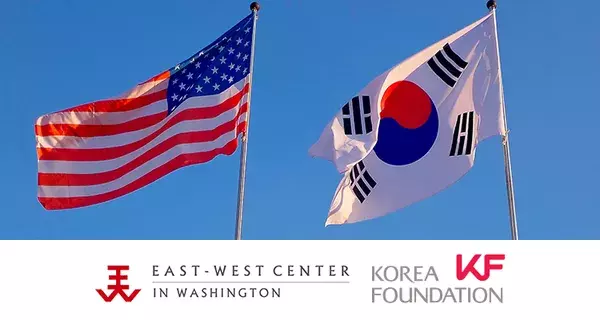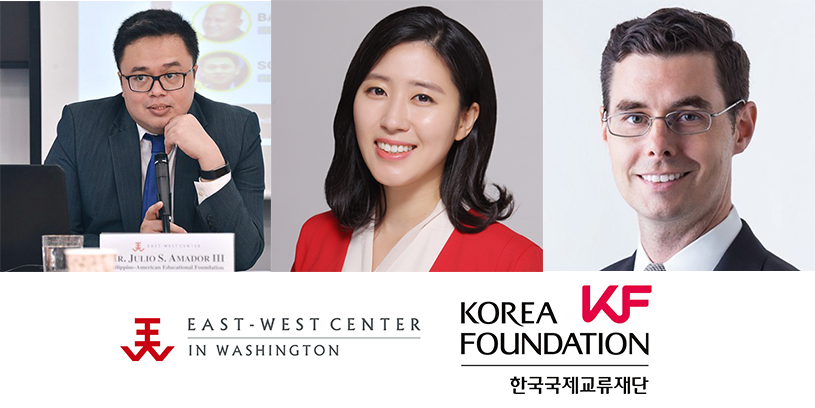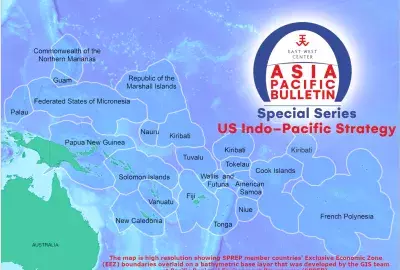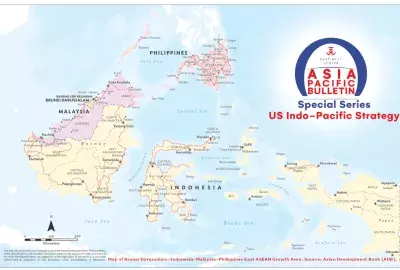Error message

Ms. Sea Young "Sarah" Kim, Visiting Scholar at the East-West Center in Washington and PhD student at Yonsei University, explains that “Washington’s and Seoul’s mutual interest in smart cities presents a valuable opportunity for the two nations to engage in tactical cooperation... under the broader framework of addressing non-traditional regional threats.” |

This piece and its companion webinar were produced as a part of the United States-Republic of Korea (ROK) Cooperation in Southeast Asia: Trade, Investment, and Multilateralism webinar series and online, collaborative policy research program, a joint effort between the East-West Center in Washington and the Korea Foundation, which generously sponsors the program
Southeast Asia is considered one of the “world’s most vulnerable” regions to climate change, according to the Asian Development Bank. Consequently, the region has numerous sectoral bodies and dialogue platforms dedicated to combatting the problem. Yet the Association of Southeast Asian Nations (ASEAN) can still benefit from external capacity-building assistance. Benefits are especially tangible for vanguard projects such as smart cities, which aim to integrate digitalization and the Internet of Things (IoT) to resolve waste management, transportation, and other urban sustainability issues. As key investors in ASEAN’s smart city initiatives, South Korea (ROK) and the United States have helped address capacity shortfalls through cross-regional private sector engagement. Apart from economic prospects, smart city projects in ASEAN serve as a critical juncture for the US Free and Open Indo-Pacific Strategy and South Korea’s New Southern Policy Plus. Washington’s and Seoul’s mutual interest in smart cities presents a valuable opportunity for the two nations to engage in tactical cooperation—consisting of both information sharing and technological innovation—under the broader framework of addressing non-traditional regional threats.
In response to the increasing need for sustainable urbanization, Southeast Asia established the ASEAN Smart Cities Network (ASCN) in 2018, consisting of 26 pilot cities across the region. ASCN has numerous advantages over other existing ASEAN projects, including a more city-oriented framework. With greater autonomy, the pilot cities can develop more tangible goals depending on their specific needs and implement projects without being held back by state bureaucracy. At the same time, ASCN faces critical limitations related to external outreach, implementation, and resource procurement. According to an interview-based study, ASEAN members lack the “strong political will” needed to advance smart city projects due to the difficulty of securing funding and the relative novelty of smart city initiatives.
Consequently, a fundamental way by which the US and South Korea have cultivated cooperation with Southeast Asia on smart cities is through the provision of financial resources. Washington launched the U.S.-ASEAN Smart Cities Partnership (USASCP) in 2018 with around 20 projects to promote sustainable city solutions in Southeast Asia, initially investing $10 million. In fact, ASEAN is the top destination for Indo-Pacific bound investment from the United States. Through USASCP, Washington has facilitated private sector engagement with smart city projects by encouraging companies like Mastercard to invest in ASEAN smart cities. Likewise, since the 2019 ASEAN-ROK Commemorative Summit, South Korea has established a bilateral ministerial-level consultative body for smart city cooperation, signing a series of MOUs with ASEAN member states, including Singapore and Thailand. Seoul also continues to invest in Southeast Asia through the Global Plant, Infrastructure and Smart City (PIS) fund, the ASEAN Korea Cooperation Fund (AKCF), and other methods.
In coordinating their joint engagement with Southeast Asia, Washington and Seoul have identified smart cities as a valuable platform for aligning the Indo-Pacific Strategy and the New Southern Policy. The Joint ROK-U.S. Roundtable on Indo-Pacific Cooperation in Energy, Infrastructure, Connectivity, and Smart Cities held in October 2019 highlights a way forward in coordinating collaboration. The roundtable demonstrates how U.S.-ROK smart city cooperation can be operationalized within a broader Indo-Pacific regional framework. The bilateral meeting has paved the way for three-way smart city infrastructural development, including a partnership between USASCP and the Korea International Cooperation Agency (KOICA) in Tam Ki city, Quang Nam Province in Vietnam.
However, smart city projects in Southeast Asia provide an opportunity for extensive cooperation beyond infrastructure and energy development. As indicated in the joint fact sheet released by Washington and Seoul in 2021, smart cities are an integral part of a larger vision for regional cooperation that includes 5G deployment, cyber capacity, and management of natural resources through information sharing. For instance, the South Korean Ministry of Foreign Affairs, K-water (Korea Water Resources Corporation), the U.S. Department of State, and NASA are currently working together to enhance data sharing methods for reducing the risk of floods and droughts in Southeast Asia’s Mekong region.
Such initiatives provide an important roadmap for more tactical cooperation going forward. For one, they help to narrow priority geographical areas for promoting US-ROK-ASEAN smart city cooperation. The three parties, for example, could focus primarily on building technological and information sharing platforms along the Mekong region before extending their efforts to other ASEAN cities. Furthermore, cooperation on disaster prevention is an area in which Washington and Seoul could cooperate based on their respective comparative advantages. While the U.S. could provide the necessary technological backing with regards to the usage of its weather satellites—including those under the U.S. Air Force Weather Agency—and data gathering support, South Korea could also aid in the development of information-sharing mechanisms. For instance, the development of smartphone applications for knowledge sharing and information dissemination have been considered signature projects by the South Korean government. At the same time, Seoul can also further develop its own information collecting technologies as it released its first indigenous geostationary weather satellite, Chollian-2A, in 2019.
Smart city cooperation among the United States, South Korea, and Southeast Asia is still in its early stages and cuts across various sectors, from waste management to renewable energy. In the nascent phase of this joint effort, it would be beneficial for the three countries to establish priority areas for framing their overall cooperation. While the connection between smart cities and disaster prevention technology has not been prominent in initiatives thus far, the potential for tactical cooperation within projects addressing non-traditional threats is vast.
Ms. Sea Young "Sarah" Kim, Visiting Scholar at the East-West Center in Washington and PhD student at Yonsei University, explains that “Washington’s and Seoul’s mutual interest in smart cities presents a valuable opportunity for the two nations to engage in tactical cooperation... under the broader framework of addressing non-traditional regional threats.” |

This piece and its companion webinar were produced as a part of the United States-Republic of Korea (ROK) Cooperation in Southeast Asia: Trade, Investment, and Multilateralism webinar series and online, collaborative policy research program, a joint effort between the East-West Center in Washington and the Korea Foundation, which generously sponsors the program
Southeast Asia is considered one of the “world’s most vulnerable” regions to climate change, according to the Asian Development Bank. Consequently, the region has numerous sectoral bodies and dialogue platforms dedicated to combatting the problem. Yet the Association of Southeast Asian Nations (ASEAN) can still benefit from external capacity-building assistance. Benefits are especially tangible for vanguard projects such as smart cities, which aim to integrate digitalization and the Internet of Things (IoT) to resolve waste management, transportation, and other urban sustainability issues. As key investors in ASEAN’s smart city initiatives, South Korea (ROK) and the United States have helped address capacity shortfalls through cross-regional private sector engagement. Apart from economic prospects, smart city projects in ASEAN serve as a critical juncture for the US Free and Open Indo-Pacific Strategy and South Korea’s New Southern Policy Plus. Washington’s and Seoul’s mutual interest in smart cities presents a valuable opportunity for the two nations to engage in tactical cooperation—consisting of both information sharing and technological innovation—under the broader framework of addressing non-traditional regional threats.
In response to the increasing need for sustainable urbanization, Southeast Asia established the ASEAN Smart Cities Network (ASCN) in 2018, consisting of 26 pilot cities across the region. ASCN has numerous advantages over other existing ASEAN projects, including a more city-oriented framework. With greater autonomy, the pilot cities can develop more tangible goals depending on their specific needs and implement projects without being held back by state bureaucracy. At the same time, ASCN faces critical limitations related to external outreach, implementation, and resource procurement. According to an interview-based study, ASEAN members lack the “strong political will” needed to advance smart city projects due to the difficulty of securing funding and the relative novelty of smart city initiatives.
Consequently, a fundamental way by which the US and South Korea have cultivated cooperation with Southeast Asia on smart cities is through the provision of financial resources. Washington launched the U.S.-ASEAN Smart Cities Partnership (USASCP) in 2018 with around 20 projects to promote sustainable city solutions in Southeast Asia, initially investing $10 million. In fact, ASEAN is the top destination for Indo-Pacific bound investment from the United States. Through USASCP, Washington has facilitated private sector engagement with smart city projects by encouraging companies like Mastercard to invest in ASEAN smart cities. Likewise, since the 2019 ASEAN-ROK Commemorative Summit, South Korea has established a bilateral ministerial-level consultative body for smart city cooperation, signing a series of MOUs with ASEAN member states, including Singapore and Thailand. Seoul also continues to invest in Southeast Asia through the Global Plant, Infrastructure and Smart City (PIS) fund, the ASEAN Korea Cooperation Fund (AKCF), and other methods.
In coordinating their joint engagement with Southeast Asia, Washington and Seoul have identified smart cities as a valuable platform for aligning the Indo-Pacific Strategy and the New Southern Policy. The Joint ROK-U.S. Roundtable on Indo-Pacific Cooperation in Energy, Infrastructure, Connectivity, and Smart Cities held in October 2019 highlights a way forward in coordinating collaboration. The roundtable demonstrates how U.S.-ROK smart city cooperation can be operationalized within a broader Indo-Pacific regional framework. The bilateral meeting has paved the way for three-way smart city infrastructural development, including a partnership between USASCP and the Korea International Cooperation Agency (KOICA) in Tam Ki city, Quang Nam Province in Vietnam.
However, smart city projects in Southeast Asia provide an opportunity for extensive cooperation beyond infrastructure and energy development. As indicated in the joint fact sheet released by Washington and Seoul in 2021, smart cities are an integral part of a larger vision for regional cooperation that includes 5G deployment, cyber capacity, and management of natural resources through information sharing. For instance, the South Korean Ministry of Foreign Affairs, K-water (Korea Water Resources Corporation), the U.S. Department of State, and NASA are currently working together to enhance data sharing methods for reducing the risk of floods and droughts in Southeast Asia’s Mekong region.
Such initiatives provide an important roadmap for more tactical cooperation going forward. For one, they help to narrow priority geographical areas for promoting US-ROK-ASEAN smart city cooperation. The three parties, for example, could focus primarily on building technological and information sharing platforms along the Mekong region before extending their efforts to other ASEAN cities. Furthermore, cooperation on disaster prevention is an area in which Washington and Seoul could cooperate based on their respective comparative advantages. While the U.S. could provide the necessary technological backing with regards to the usage of its weather satellites—including those under the U.S. Air Force Weather Agency—and data gathering support, South Korea could also aid in the development of information-sharing mechanisms. For instance, the development of smartphone applications for knowledge sharing and information dissemination have been considered signature projects by the South Korean government. At the same time, Seoul can also further develop its own information collecting technologies as it released its first indigenous geostationary weather satellite, Chollian-2A, in 2019.
Smart city cooperation among the United States, South Korea, and Southeast Asia is still in its early stages and cuts across various sectors, from waste management to renewable energy. In the nascent phase of this joint effort, it would be beneficial for the three countries to establish priority areas for framing their overall cooperation. While the connection between smart cities and disaster prevention technology has not been prominent in initiatives thus far, the potential for tactical cooperation within projects addressing non-traditional threats is vast.







